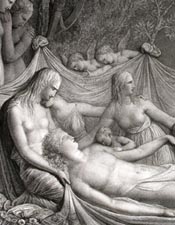Lament for Adonis and The Lament for Bion
, translated by Kline, A. S. (contact-email)
The Lament for Adonis is attributed to Bion (fl. c100BC), a Greek poet, of ancient Lydia (now Izmir, Turkey). He was noted as a poet of the countryside, writing in the Doric dialect and, with Moschus and Theocritus, is one of a trio of major bucolic poets writing in that period. His work, of which this lament and a few fragments survive, was alluded to by Catullus and Ovid, and influenced later poems of lament, notably Shelley’s ‘Adonais’, his elegy for Keats. The Lament survived in two medieval manuscripts only.
The Lament for Bion, on the other hand, was long attributed to Moschus of Syracuse (fl. c150BC), though Bion was the younger man (fl. c100BC), but is now thought to have been written by a pupil of Bion. Like Bion’s own ‘Lament for Adonis’ it had a great influence on subsequent elegies for dead poets, for example Deschamps’ double-lament for Machaut, and Milton’s ‘Lycidas’.

Kline, A. S.
Support Open-Access:
Your contribution keeps our classical translations available to all. Every dollar helps support classics education and funds the expansion of our catalogue. Value what we do? Donate now.
File Downloads:
© Copyright, All Rights Reserved. This work may be freely reproduced, stored and transmitted, electronically or otherwise, for any non-commercial purpose. Conditions and Exceptions apply.